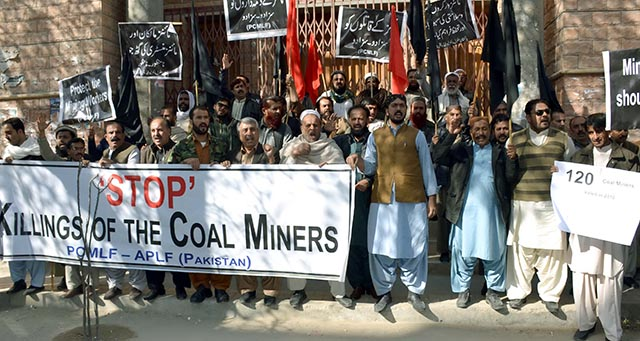A blast in the Chamalang coal mines in Loralai district in Balochistan on January 2 led to the death of 4 miners and caused critical injuries to 1. In a statement to Geo News, the chief mine inspector of Balochistan, Iftikhar Ahmed, said the explosion was a result of gas filling the mine while the workers were extracting coal. The injured miner and the bodies of those killed were retrieved by their fellow workers.
According to the Pakistan Central Mines Labour Federation (PCMLF), the four coal miners, two of whom were siblings, belonged to the same family and hailed from Afghanistan. The victims were identified as Habibur Rehman, Muhammad Sadiq, Javed, and Khalid. The injured miner was identified as Rehmatullah. Another death was reported on December 31 in the Sharigh mines in the Khost area. The death was caused due to poisonous gas leakage.
The incident occurred days after the PCMLF and the All Pakistan Labour Federation (APLF) staged a demonstration and a rally in front of the Quetta Press Club to protest government negligence and abysmal working conditions in the mines. These conditions have led to nearly 120 deaths and injuries to nearly 117 workers in the past few months. According to estimates made by the PCMLF, mine-related accidents lead to nearly 100-200 deaths every year.
According to official estimates made by the Balochistan Mines and Minerals Development Department, there are about 250 mines employing around 12,000 people. However, PCMLF estimates place the number of mines at 400, employing nearly 100,000. A major reason for the wide disparity in the reported numbers is the fact that a large number of mines are not registered with the government. As a result, those working in these mines are not included in government data and are often unable to avail medical and wage benefits. Miners usually begin work at the age of 13 and continue till they are about 30 years old, when they are forced into unemployment due to chronic respiratory illnesses, tuberculosis, loss of eyesight, injuries, etc. caused due to the hazardous working conditions. They are often forced to work for over 10 hours a day without adequate safety gear, which is in violation of Pakistan’s labor laws. Mines in this region are highly susceptible to gas leakages and explosions, collapse of the mine stopes, technical malfunctions, and other accidents. In the absence of well-equipped emergency response teams, other workers often end up being the first responders which, in a lot of the cases, leads to further casualties. Many workers ‘retire’ under such circumstances, often without pension or unemployment benefits.
In the demonstration held on December 31, the PCMLF put forth the following demands: 1) rigorous punishments to those found guilty of negligence; 2) mines where fatal accidents have occurred be immediately sealed; 3) the implementation of the Mines Act (1923) and the ratification of the International Labour Organisation Convention- 176 (Safety and Health in Mines, 1995); and 4) conducting surveys and training programs for workers in coal mines. There has been a sustained demand for improved regulations and implementation of existing laws. An application was filed in the Pakistani Supreme Court in September, urging that a judicial inquiry be undertaken into the working conditions in the mines in Balochistan. Citing at least 45 accidents which had led to nearly 320 fatalities in the years 2010-2018, the application highlighted the need for the enforcement of existing guidelines, the identification of key stakeholders and subsequently the allocation of liability, and the implementation of adequate safety measures among other recommendations.
The fatalities reported in Balochistan area are part of a distressing trend in South Asia. Another instance was recently witnessed in the State of Meghalaya in India. Rescue efforts are underway for a group of 15 miners who have been stuck in a collapsed ‘rat-hole’ coal mine in Ksan in the East Jaintia Hills region for around 20 days. Rathole mining has been prevalent in the State despite a ban issued by the National Green Tribunal in 2014. Rescue efforts were reportedly halted due to technical failures and low visibility due to flooding. Moreover, since the mine is illegal there exist no blueprints of its structure making navigation difficult.
The Supreme Court of India, in response to a petition filed on January 3rd urging the need for escalating rescue efforts, has directed the Centre and the State Government of Meghalaya to file a status report regarding the rescue mission by 7th January.





